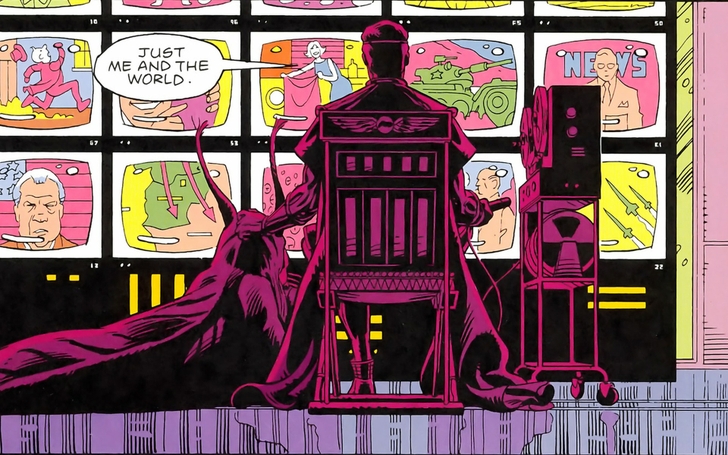

And perhaps the greatest lesson here is not that these are the only two choices, but rather that people should be wary of relinquishing personal responsibility to those in power. There’s no simple nor tidy answer, especially with the stakes heightened to the point where Rorschach’s noble deed seems detrimental and Ozymandias’s “saving” the world seems moot. The result is two unappealing choices for who is right: the unapologetic, objectivist moralist who risks armageddon based on what he believes to be “good,” or the clinical amorality of a genius utilitarian who kills millions of people to achieve harmony. In 1986, Watchmen skewered the way we love superheroes. In order to prevent that from happening, Doctor Manhattan obliterates Rorschach in the name of the greater good. Though Rorschach sticking to his morals is noble - lying to people about millions of deaths is unconscionable - the situation is positioned in such a way that if he spills the truth, it will inevitably wreck the fragile peace Ozymandias achieved. Only Rorschach, the most obstinate of the heroes, doesn’t go along with the cover-up. With the plan and the people executed - and the story’s heroes unable to undo what Ozymandias has wrought - everyone who had learned about the plan beforehand is faced with a moral dilemma: Tell people about the mass murder Ozymandias committed and inevitably trigger nuclear war, or remain quiet about the fact that the genocide was man-made. Ozymandias celebrating his plan in Watchmen Gibbons/DC Countries around the world, including Russia, see the terror in New York City and offer support to the United States, burying any simmering political hostilities until the horrors are stopped. In the novel, World War III: Nuclear Party Time is inevitable, and Ozymandias’s plan works.

Those who survive the shockwave go mad and are driven to violence by the sensory overload. The squid, with a brain cloned from a human psychic, releases a shockwave that instantly kills millions. Moore writes the story in a way that gives Ozymandias intellectual authority, and as such, other heroes (like Doctor Manhattan) go along with him. Ozymandias’s plan wasn’t without its supporters, either. He sees it as the only way to keep the world’s superpowers from killing each other in a nuclear war. Ozymandias, unleashes a colossal alien squid upon New York City. In the final chapter of the comic, Adrian Veidt, a.k.a. But the most challenging bit comes at the end of the novel, forcing us to examine our own ideas about morality and humanity - and that would be the squid attack. The Watchmen graphic novel encompasses a variety of strange elements, ranging from an omnipotent blue man who prefers to be naked all the time to the power politics at play in the United States and Great Britain in the 1980s (which we’ve come to associate with Ronald Reagan and Margaret Thatcher). The squid attack is about theology, morality, and choosing between one evil or another And through his revelation, the viewer learns that the ultra-violent squid attack in Watchmen, like everything in Watchmen, means so much more than what it originally seems. Veidt claims responsibility for the scarring event, and Looking Glass learns that Americans are just statistics and disposable figures to the very powerful, including Veidt and the government. the villain of the Watchmen graphic novel, who explains that the squid was a fake attack for the better of the nation. He watches a recording of the space-bound billionaire Adrian Veidt, a.k.a. Looking Glass finds out the answers to these questions first-hand. Though the squid attack is indeed bizarre (director Zack Snyder nixed the cephalopod assault from his 2009 cinematic adaptation, for example), it’s part of the most important question in writer Alan Moore and artist Dave Gibbons’s graphic novel: Who holds accountable the most powerful people, and what decisions will they make when they’re left unchecked? To Looking Glass’s chagrin, the apparent apocalypse comes sooner rather than later, and he plays witness to mass death, destruction, and disorder in the form of a genocidal squid storming his local fair. We meet him as a teen trying to promote the good word of Doomsday, how the end is near, and how God has pandas in heaven. The 1980s-era of the Watchmen world is seen through the eyes of Looking Glass, the stalwart police officer with a mirrorball face and the uncanny ability to tell when people are lying. The fifth episode of Watchmen, “Little Fear of Lightning,” takes us back to the ’80s - the age of hairspray, leather jackets, Howard Jones’s hit “ Things Can Only Get Better,” the Cold War, and, in this universe, a psychic squid attack.


 0 kommentar(er)
0 kommentar(er)
